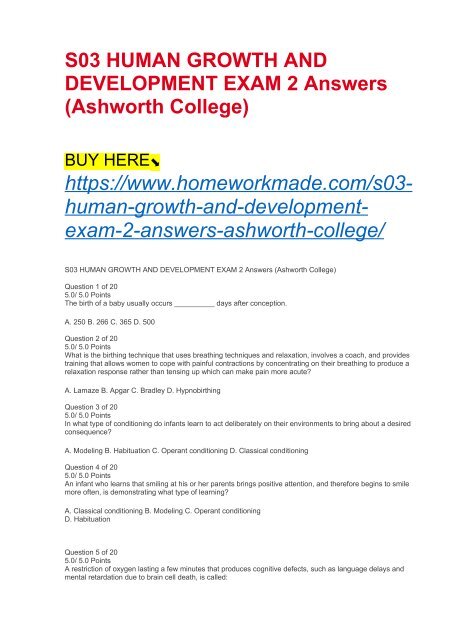S03 HUMAN GROWTH AND DEVELOPMENT EXAM 2 Answers (Ashworth College)
Create successful ePaper yourself
Turn your PDF publications into a flip-book with our unique Google optimized e-Paper software.
<strong>S03</strong> <strong>HUMAN</strong> <strong>GROWTH</strong> <strong>AND</strong><br />
<strong>DEVELOPMENT</strong> <strong>EXAM</strong> 2 <strong>Answers</strong><br />
(<strong>Ashworth</strong> <strong>College</strong>)<br />
BUY HERE⬊<br />
https://www.homeworkmade.com/s03-<br />
human-growth-and-developmentexam-2-answers-ashworth-college/<br />
<strong>S03</strong> <strong>HUMAN</strong> <strong>GROWTH</strong> <strong>AND</strong> <strong>DEVELOPMENT</strong> <strong>EXAM</strong> 2 <strong>Answers</strong> (<strong>Ashworth</strong> <strong>College</strong>)<br />
Question 1 of 20<br />
5.0/ 5.0 Points<br />
The birth of a baby usually occurs __________ days after conception.<br />
A. 250 B. 266 C. 365 D. 500<br />
Question 2 of 20<br />
5.0/ 5.0 Points<br />
What is the birthing technique that uses breathing techniques and relaxation, involves a coach, and provides<br />
training that allows women to cope with painful contractions by concentrating on their breathing to produce a<br />
relaxation response rather than tensing up which can make pain more acute?<br />
A. Lamaze B. Apgar C. Bradley D. Hypnobirthing<br />
Question 3 of 20<br />
5.0/ 5.0 Points<br />
In what type of conditioning do infants learn to act deliberately on their environments to bring about a desired<br />
consequence?<br />
A. Modeling B. Habituation C. Operant conditioning D. Classical conditioning<br />
Question 4 of 20<br />
5.0/ 5.0 Points<br />
An infant who learns that smiling at his or her parents brings positive attention, and therefore begins to smile<br />
more often, is demonstrating what type of learning?<br />
A. Classical conditioning B. Modeling C. Operant conditioning<br />
D. Habituation<br />
Question 5 of 20<br />
5.0/ 5.0 Points<br />
A restriction of oxygen lasting a few minutes that produces cognitive defects, such as language delays and<br />
mental retardation due to brain cell death, is called:
A. Apgar. B. anoxia. C. episiotomy. D. lanugo.<br />
Question 6 of 20<br />
5.0/ 5.0 Points<br />
Preterm infants are at a high risk of illness and death because:<br />
A. they usually have to be born by Cesarean section.<br />
B. they have not had time to fully develop.<br />
C. their mothers have used anesthesia during childbirth.<br />
D. they have a chromosomal disorder.<br />
Question 7 of 20<br />
5.0/ 5.0 Points<br />
Although __________ of all newborns in the United States fall into the low-birthweight category, they account<br />
for __________ of newborn deaths.<br />
A. 15%; all B. 7%; the majority C. 7%; the minority<br />
D. 15%; the majority<br />
Question 8 of 20<br />
5.0/ 5.0 Points<br />
Research indicates that the following types of care, with the exception of one, appear to be effective in helping<br />
preterm infants develop. Identify the exception.<br />
A. Kangaroo Care B. Infants are held skin-to-skin against the parents’ chests.<br />
C. Massage several times a day. D. Almost constant use of an incubator<br />
Question 9 of 20<br />
5.0/ 5.0 Points<br />
What is another term for a Cesarean birth?<br />
A. Fetal distress B. Postmature C. Stillborn D. C-section<br />
Question 10 of 20<br />
5.0/ 5.0 Points<br />
The different degrees of sleep and wakefulness through which newborns cycle, ranging from deep sleep to<br />
great agitation, are called:<br />
A. social interaction. B. consciousness. C. states of arousal. D. attentiveness.<br />
Question 11 of 20<br />
5.0/ 5.0 Points<br />
When the critical hormone __________ is released in high enough concentration by the mother’s pituitary<br />
gland, the mother’s uterus begins periodic contractions.<br />
A. oxytocin B. corticotropin-releasing C. cortisol D. oxycontin<br />
Question 12 of 20<br />
5.0/ 5.0 Points<br />
Newborns are born with innate sensory abilities that they do not have to learn; however, one way they learn<br />
about their environment is via the __________ method first identified by Pavlov.<br />
A. operant conditioning B. habituation conditioning<br />
C. modeling D. classical conditioning<br />
Question 13 of 20<br />
5.0/ 5.0 Points<br />
Which form of learning relies upon newborns producing an “orienting response” in which they become quiet,<br />
attentive, and experience a slowed heart rate as they “take in” the novel stimuli?<br />
A. Habituation B. Operant conditioning C. Classical conditioning
D. Modeling<br />
Question 14 of 20<br />
5.0/ 5.0 Points<br />
Tiffany Field’s research suggests that infants can discriminate between all of the following basic facial<br />
expressions except one. Which expression is NOT discriminated by newborns?<br />
A. Fear B. Happiness C. Surprise D. Sadness<br />
Question 15 of 20<br />
5.0/ 5.0 Points<br />
A newborn baby scores under 4 on the Apgar scale. This means that the baby:<br />
A. is normal and healthy. B. requires help to start breathing.<br />
C. needs immediate, life-saving intervention. D. is premature.<br />
Question 16 of 20<br />
5.0/ 5.0 Points<br />
A standard measurement system that looks for a variety of indications of good health in newborns is called the<br />
__________ scale.<br />
A. bonding B. Apgar C. Lamaze D. Bradley<br />
Question 17 of 20<br />
5.0/ 5.0 Points<br />
Approximately __________% of Caucasian American women and approximately __________% of African<br />
American women receive no prenatal care early in their pregnancies.<br />
A. 50; 75 B. 10; 50 C. 20; 40 D. 30; 50<br />
Question 18 of 20<br />
5.0/ 5.0 Points<br />
A form of learning in which a voluntary response is strengthened or weakened, depending on its association<br />
with positive or negative consequences is called:<br />
A. operant conditioning. B. habituation. C. classical conditioning.<br />
D. modeling.<br />
Question 19 of 20<br />
5.0/ 5.0 Points<br />
What is the term for a period of deep depression following the birth of a child that affects approximately 10% of<br />
all new mothers for months or even years?<br />
A. Postpartum depression B. Stillborn C. Infant mortality D. Crib death<br />
Question 20 of 20<br />
5.0/ 5.0 Points<br />
What birthing method has achieved widespread popularity in the United States, and involves breathing<br />
techniques and relaxation training?<br />
A. Apgar B. Lamaze C. Bradley D. Natural

















